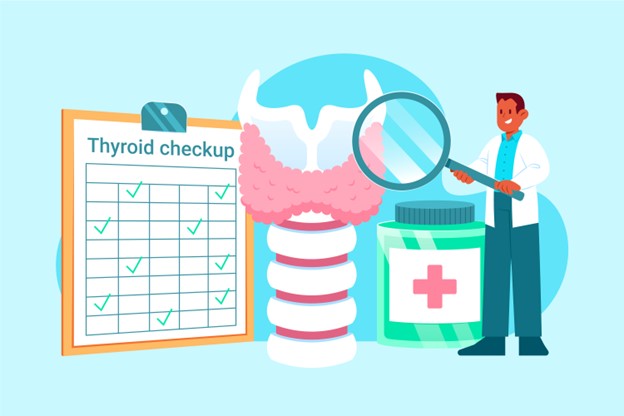The thyroid gland, found at the neck’s base, is vital for health. It makes hormones, T3 and T4, which keep your energy steady and ensure your weight stays stable. These hormones control much of how your body uses food for energy. The thyroid affects nearly all systems in our bodies every single day.
India has seen a growing number of thyroid issues recently. Changes in diet, mounting stress, and genetics are some causes. City dwellers face more cases of underactive and overactive thyroid glands. Less movement in daily life and diet choices add to the problem. It’s important to notice signs early and use thyroid panel tests to catch issues before they develop.
Thyroid panel tests help spot thyroid problems early on. They measure hormones even if there are no clear signs yet. Acting early means treating it soon and stopping major health issues later. Regular checks through a thyroid blood test can prevent big problems, helping those at risk live better lives.
Importance of the Thyroid Gland: Its Role and Functions
The thyroid gland looks like a butterfly and sits on your neck. It’s small but plays a crucial role in keeping you healthy daily. It produces hormones that oversee many vital processes in your body, including your metabolism.
The thyroid creates two main hormones called T3 and T4. These hormones are key players in managing how your body uses energy. T3 is the active hormone, while T4 acts as a backup that converts to T3 when needed. Together, they ensure your heart beats right and maintain steady body weight.
T3 and T4 also affect how you feel emotionally. They keep your mood balanced by supporting brain functions. In children, these hormones aid in growing and brain development, vital for a bright future. When their levels are off, you might feel it both physically and mentally.
Recognizing Symptoms: When to Consider Thyroid Panel Tests
If you’re often tired, it might mean a thyroid problem. Weight changes without reason could also show an issue. Losing a lot of hair suddenly is another warning sign. These symptoms mean it might be wise to take a thyroid pannel test.
Pregnant women and older people need more focus on these tests. Hormones can change more in pregnant women, risking health issues for the baby and mother. Older folks might think their low energy is normal aging, missing thyroid problems. Testing helps them get the right treatment for their age and condition.
Things like diet and tension can affect how your thyroid works too. Eating foods low in iodine or processed foods can cause problems. When stress is high, it can change hormones that impact the thyroid. Keeping a healthy diet and managing stress are both key to maintaining good thyroid health.
Decoding a Thyroid Panel: What Does It Measure?
A thyroid panel test measures key components crucial for thyroid diagnosis. This includes Thyroid Stimulating Hormone (TSH), Free T4, and Free T3. The pituitary gland releases TSH, helping to regulate T3 and T4 production. These levels reflect whether the thyroid is overactive or underactive.
- TSH: It shows how well the thyroid gets signals to make hormones.
- Free T4: It measures thyroxine levels available for conversion into T3.
- Free T3: It checks the active hormone used for vital body functions.
Each part of the thyroid panel test provides unique insights into thyroid health. High TSH often signals hypothyroidism, meaning the thyroid is slow. Low levels suggest hyperthyroidism, showing an overactive thyroid. Abnormal Free T4 and Free T3 readings help identify different thyroid problems.
Other tests, like thyroid antibodies and Reverse T3, offer more insights. Antibody tests find autoimmune disorders such as Hashimoto’s or Graves’ disease. With these disorders, the body attacks its own thyroid wrongly. Reverse T3 checks the body’s stress response on hormone regulation. Together, these tests give precise diagnoses and guide better treatment options.
Interpreting Thyroid Panel Results: Understanding Their Significance
A vital part of a thyroid panel test is the Thyroid Stimulating Hormone (TSH) level measurement. High TSH levels can suggest an underactive thyroid, or hypothyroidism, where the gland produces too few hormones. A low TSH level might indicate an overactive thyroid, or hyperthyroidism, producing an excess of hormones. Understanding these results helps in effective treatments.
Besides TSH testing, thyroid panel tests often measure Free T4 (thyroxine) and Free T3 (triiodothyronine). These hormones freely circulate and give insight into thyroid function. Low levels can support a diagnosis of hypothyroidism if TSH is high. High T4 and T3 levels with low TSH signal hyperthyroidism. Diagnosing accurately depends on these results together.
Antibody tests are also part of a complete thyroid panel, detecting autoimmune issues like Hashimoto’s thyroiditis and Graves’ disease. These tests look for antibodies attacking thyroid tissue, causing dysfunction. High levels of thyroid peroxidase antibodies indicate Hashimoto’s disease. Identifying these markers helps determine the cause and appropriate treatment plan.
Common Thyroid Disorders and Treatment Options
Hypothyroidism happens when the thyroid can’t make enough hormones needed by the body. This leads to feeling tired, gaining weight, and feeling down. In contrast, hyperthyroidism creates too much hormone, causing fast heartbeats and losing weight quickly. Autoimmune issues often make the body’s defense turn against the thyroid itself. Learning about these problems helps provide better treatments.
The typical fix for hypothyroidism involves a synthetic replacement for the lost hormones. Getting the right dose needs careful monitoring to prevent heart race or other issues. For hyperthyroidism, doctors might pick drugs that slow hormone output down. An option also is using radioactive iodine to bring thyroid activity under control. Staying alert to possible side effects is key, with frequent checkups being necessary.
Looking at lifestyle impacts is crucial in treating thyroid problems effectively. Stress makes things worse for thyroid functionality, so using methods like relaxation is helpful. Eating right counts too since iodine and selenium boost thyroid health positively. Exercise regularly and following a balanced eating plan can ease symptoms more broadly. Embracing lifestyle changes offers critical support in achieving success with treatment plans.
After the Test: Next Steps and Myths Debunked
Upon receiving thyroid panel results, contact your doctor about any irregularities. Follow their advice for more tests or possible treatment if needed. Regular monitoring of thyroid hormones helps in managing and preventing complications. Ongoing evaluations might be required to check treatment effectiveness.
Some believe every thyroid disorder requires life-long medication, but that’s not true. Many cases improve with lifestyle adjustments alone. Always get personalized advice from healthcare providers for the best approach. Not every diagnosis leads to a lifetime medication regime.
Simple changes can greatly benefit thyroid health effectively. Eating regular, balanced meals full of necessary nutrients supports hormone levels nicely. Adding selenium and iodine-rich foods like seafood and nuts is beneficial too. Staying active and practicing stress reduction methods like yoga or meditation help improve thyroid health naturally. Incorporating these adjustments can manage or enhance thyroid conditions, offering natural relief.
Perspectives on Thyroid Health in India: Cultural Myths and Realities
Thyroid disorders are more common in India these days. Various factors, including urban living and stress, make them rise. Family history and the surroundings also play parts in increasing risk. It’s vital to know this and take steps to stay healthy.
Some beliefs about thyroid issues aren’t always accurate. People often think it’s due to poor nutrition alone. However, other elements such as family genes and the environment cannot be overlooked. Passing on this knowledge helps people understand better and follow treatments properly.
Doing regular health checks can help find thyroid issues early on. Without an early diagnosis, symptoms can get worse over time. Promoting regular health exams creates public awareness and lowers thyroid problem numbers. Community talks about thyroid health encourage managing it before it turns severe.
Conclusion: Taking Charge of Your Thyroid Health
Understanding thyroid panel tests keeps you in good health. They show hormonal imbalances that may impact your mood and health.
Working with healthcare professionals helps make sense of these test results. You avoid misunderstandings by asking questions like if the TSH blood test requires fasting.
Awareness in the community can improve preventive care for thyroid disorders. Share information about test costs and fasting requirements for a full thyroid panel, so more people improve their health decisions.
Take Control of Your Thyroid Health Today with Cure Path
Don’t wait for symptoms to worsen—early detection is key.
Book your Comprehensive Thyroid Panel Test with Cure Path and get accurate insights into your thyroid function.
- Expert-guided testing and interpretation
- Personalized treatment plans tailored for you
- Convenient appointments and trusted care
Your thyroid health impacts your entire body—prioritize it now!
📞 Call us to schedule your test today.
Cure Path — Your trusted partner on the road to better health.

